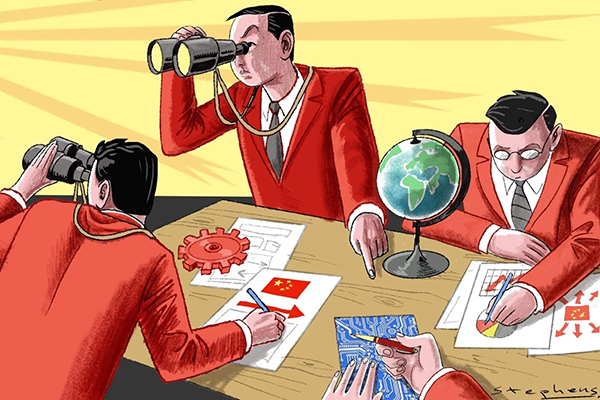Wang Huiyao: In a broken world, China-Japan-Korea cooperation is Asia’s backbone
SCMP | April 01 , 2025From SCMP, 2025-4-1
■ By blending economic might, technological prowess and cultural bonds, cooperation can be elevated into a transformative, inspiring force.
By Wang Huiyao | Founder of the Center for China and Globalization(CCG)
Chinese Foreign Minister Wang Yi was in Tokyo recently for the 11th China-Japan-South Korea Trilateral Foreign Ministers’ Meeting – the first since November 2023. During the visit, he also co-chaired the Sixth China-Japan High-Level Economic Dialogue with Japan’s Foreign Minister Takeshi Iwaya.
The results were promising: 20 consensus points emerged from the economic dialogue, spanning trade to green development, alongside a commitment to hold a trilateral summit by the end of the year.
Just days earlier, speaking at the 20th Roundtable Japan in Tokyo, I witnessed the palpable momentum for cooperation in East Asia. Our three nations are bound by geography – neighbours who cannot escape one another. This proximity demands that we prioritise our geopolitical relationships, harnessing our collective strengths for mutual benefit.
Our economic interdependence is a cornerstone of regional stability. Last year, China-Japan trade hit US$293 billion – Japan is China’s second-largest trading partner, while China is Japan’s top trading partner and import source, though the second-largest export market after the US. South Korea’s exports to China, its biggest market, rose by 6.6 per cent last year. Investment flows thrive too: Japanese companies bolster China’s manufacturing, while Chinese companies tap South Korea’s tech sectors.
Yet, global trade faces headwinds. The return of US President Donald Trump signals renewed protectionism, with tariff threats and a US-led North American bloc looming.
Wang has stressed that talks on a China-Japan-South Korea free trade agreement should be resumed soon. Building on the Regional Comprehensive Economic Partnership (RCEP), which has boosted intraregional exports, such an agreement could leverage Japan’s precision manufacturing, South Korea’s semiconductor prowess and China’s logistical might.
China is also pursuing frameworks such as the Digital Economy Partnership Agreement (DEPA) – initiated by New Zealand, Singapore and Chile – and the Comprehensive and Progressive Agreement for Trans-Pacific Partnership (CPTPP). Japan, a CPTPP linchpin, could support China’s accession, fostering shared prosperity.
Beyond trade, cooperation must address regional challenges. First, ageing populations pose a crisis. China has over 300 million people aged 60 or older – nearly a quarter of its population – straining healthcare and pensions. Japan, with decades of experience in elderly care and robotics, and South Korea, with its healthcare tech innovations, offer models worth emulating. Joint research could turn this demographic shift into an opportunity.
Second, climate change demands collective action. Sharing the same ecosystem, we face challenges from air pollution to marine threats. Recent dialogue includes the September 20 consensus reached between China and Japan committing to transparency over the management of radioactive water from the Fukushima nuclear plant.
Third, supply chain resilience is vital amid disruptions. China’s ports, railways and workforce complement Japan’s manufacturing and South Korea’s semiconductor expertise. Our proximity positions us to forge secure, efficient supply chains – imagine a “Made in East Asia” label rivalling global competitors.
Economic ties are only half the story. Our shared heritage – steeped in Confucianism and Buddhism – fosters mutual understanding. These traditions emphasise harmony and respect, easing communication at governmental and societal levels.
Among youth, this bond thrives: K-pop fans in China, anime lovers in South Korea and Chinese students in Japanese universities fuel a dynamic cultural exchange. Tourism amplifies this connection – China’s visa facilitation measures, paired with Japan’s welcoming policies, have sparked a surge in visits.
This reflects the power of open borders and a shared culture. As these ties deepen, political barriers erode, paving the way for a united East Asia.
Regional integration is gaining momentum, and Asia must seize this opportunity to lead. As economic powerhouses, China, Japan and South Korea – representing 1.6 billion people – can spearhead this effort alongside the Association of Southeast Asian Nations and other partners, gradually forging an “Asian Union” that could unite nearly half the world’s population and economy by the middle of the century.
McKinsey predicts Asia will drive half of global consumption growth by 2030, a testament to our innovation potential: China supplies nearly half the world’s top artificial intelligence (AI) talent, while Japan and South Korea stand among global leaders in patent filings.
DEPA’s emphasis on digital trade complements the RCEP and CPTPP, bolstering regional resilience and cementing Asia’s role as a global digital leader. This trio could pioneer joint initiatives such as coordinated AI research hubs linking Beijing, Tokyo and Seoul or a unified e-commerce platform streamlining trade.
Our combined market size and innovation capacity rival any bloc’s, offering a counterbalance to Western dominance and reducing reliance on external powers. Success here could inspire broader Asian unity, from standardised 5G networks to joint space exploration. By blending economic might, technological prowess and cultural bonds, we can elevate cooperation into a transformative force, inspiring global integration.
The trilateral partnership of China, Japan, and South Korea is Asia’s backbone. In a fractured world, it’s our lifeline. Trade, supply chains and cultural bonds trump differences. The consensus points reached in Tokyo prove pragmatism works. Let’s harness our strengths and shape an Asian century – now.
From SCMP, 2025-4-1
Recommended Articles
-

Wang Huiyao: Key lessons from China’s ascent over the past 25 years
-
Wang Huiyao: China and Latin America: Partners in a shared new era
-
Wang Huiyao: Only a multipolar coalition can secure Ukraine peace
-
Wang Huiyao: How to Fix the Security Council
-
Wang Huiyao: Critics are missing the big picture on China’s economic transition